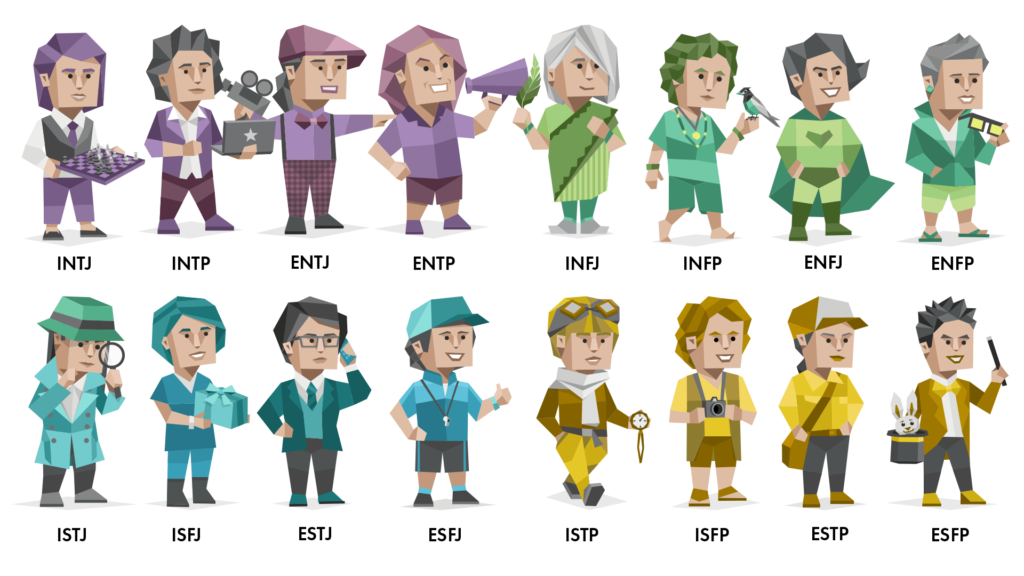Do you ever find yourself wondering why you react to certain situations in a particular way? Are you curious about what makes you, you? Behold the Myers-Briggs Type Indicator, or MBTI for short, a ground-breaking way to understand yourself and others.
The MBTI personality test has become a widely-used tool in today’s world. It’s an online test that helps individuals identify their personality type based on four dichotomies: extraversion/introversion (E/I), sensing/intuition (S/N), thinking/feeling (T/F), and judging/perceiving (J/P). Each dichotomy has two opposing traits, and the combination of the four produces sixteen unique personality types.
The logic behind the test is simple yet reliable. Psychologist Carl Jung first proposed the concept of psychological types in the early 20th century, and the MBTI was developed by mother-daughter team Katharine Briggs and Isabel Myers, who built upon Jung’s ideas. Since then, the test has been extensively researched and validated, with millions of people taking it every year.
What makes the MBTI so accurate is that it uses a self-reported questionnaire that relies on the test-taker’s own perception of themselves. Unlike other personality tests that are based on external observations or interpretations, the MBTI allows individuals to provide their own insights into their personality.
But what makes the MBTI even more interesting is how it can provide insight into our innate preferences and behaviours, helping us understand why we act the way we do in different situations. The test can provide a foundation for self-awareness and personal growth, allowing us to leverage our strengths and work on our weaknesses.
For example, individuals who score as introverted may realize that they need time alone to recharge their energy, while those who score as extraverted may thrive on social interactions. Individuals who score as feeling may place greater importance on emotional harmony, while those who score as thinking may prioritize logic and reason.
Furthermore, understanding the MBTI can also help us to communicate and interact more effectively with others. By identifying others’ personality types, we can tailor our communication style to suit their preferences, whether it be through email, in-person conversations, or even body language.
Here’s a brief overview of the sixteen types, and the roles that are often associated with them:
- ISTJ – The Inspector: Logical, analytical, and responsible, ISTJs make excellent administrators, accountants, and auditors.
- ISFJ – The Protector: Kind, caring, and loyal, ISFJs excel in roles such as nurses, teachers, and social workers.
- INFJ – The Counselor: Empathetic, insightful, and creative, INFJs make excellent therapists, writers, and artists.
- INTJ – The Mastermind: Strategic, visionary, and independent, INTJs are well-suited for roles such as scientists, engineers, and entrepreneurs.
- ISTP – The Craftsman: Practical, hands-on, and adventurous, ISTPs thrive in roles such as mechanics, pilots, and firefighters.
- ISFP – The Composer: Artistic, sensitive, and free-spirited, ISFPs excel in roles such as musicians, designers, and photographers.
- INFP – The Healer: Idealistic, empathetic, and creative, INFPs make excellent writers, counselors, and human rights advocates.
- INTP – The Architect: Logical, analytical, and innovative, INTPs are well-suited for roles such as researchers, analysts, and professors.
- ESTP – The Dynamo: Bold, action-oriented, and charismatic, ESTPs thrive in roles such as salespeople, athletes, and entrepreneurs.
- ESFP – The Performer: Enthusiastic, playful, and outgoing, ESFPs are well-suited for roles such as actors, event planners, and tour guides.
- ENFP – The Champion: Curious, creative, and energetic, ENFPs excel in roles such as teachers, writers, and marketers.
- ENTP – The Visionary: Inventive, witty, and logical, ENTPs make excellent entrepreneurs, inventors, and lawyers.
- ESTJ – The Supervisor: Responsible, practical, and efficient, ESTJs are well-suited for roles such as managers, project coordinators, and military leaders.
- ESFJ – The Provider: Warm, friendly, and nurturing, ESFJs excel in roles such as nurses, teachers, and customer service representatives.
- ENFJ – The Teacher: Charismatic, empathetic, and organized, ENFJs make excellent teachers, counselors, and coaches.
- ENTJ – The Commander: Confident, strategic, and assertive, ENTJs are well-suited for roles such as CEOs, politicians, and military leaders.
Each personality type has its own set of strengths and weaknesses, making them better suited for some roles than others. In a world where relationships and communication are essential, the MBTI can provide an invaluable help for building stronger connections and gaining a deeper understanding of ourselves and others.
Without a doubt, the reliability, simplicity, and wide usage of the MBTI test make it a valuable resource and tool. However, it’s important to remember that these are just generalizations, and that everyone is unique. The MBTI is meant to be used for self-awareness and personal growth, rather than a way to categorise or discriminate individuals.
Want to know your personality type? I’m an INFP, like Anne of Green Gables, and J.R.R Tolkien! Take the test and discover yours <3

1 thought on “MBTI: A Game-Changing Approach to Understanding Yourself and Others”
Your posts always leave me feeling motivated and empowered You have a gift for inspiring others and it’s evident in your writing